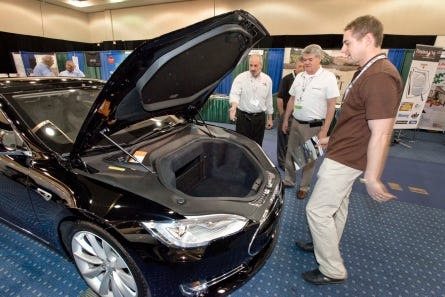
“Gulf Power is really interested in this,” said Jeff Rogers, the company’s corporate communications manager. “We have been studying electric vehicles for 20 years in anticipation of them hitting the market, studying our grid and infrastructure to make sure it could handle the added load of people pulling into their garage every night and plugging it in.
“(We’ve been) studying the vehicles so we can help people make wise decisions when purchasing them, and studying different technologies to see what works best,” Rogers added.
Southern Company, the parent firm of Gulf Power, has about 10 electric and hybrid vehicles it is testing for battery capacity, miles per gallon, charge times and charge patterns. Among the company’s vehicles is the Toyota Prius hybrid, a VTRUX electric pickup truck made by Via Motors and two cars from Tesla Motors.
The Tesla Roadster was the first electric vehicle Southern Company purchased. It later bought the new Tesla Model S sedan.
“The thing about the Tesla, the coupe was the first one to break the 200-mile barrier on a single charge. Phenomenal,” Rogers said. “And that was because of the battery technology and charging technology they were using and the regenerative breaking. That’s not really a practical car, though. The coupe was very tight. I could hardly get in that one.
“(The Model S) is like a big, roomy sedan,” he said. “Same concept, same type of battery, same type of generators, same regenerative breaking. Of course it’s much more sophisticated than even (the Roadster) was.”
Watch a Tesla test drive video.
The Nissan Leaf gets the best mileage from a single electrical charge and costs much less than the Teslas. The Tesla Model S has a base price ranging from $49,000 to $98,000, while the Leaf, which gets about 74 miles per charge, has a base price of $28,800. Gulf Power offers a $1,000 incentive for customers in its Energy Select program who purchase an electric vehicle.
If the electric vehicles become popular in the area, Rogers said Gulf Power likely would not build charge stations for vehicles along the roads, but still would be involved somehow.
“We would probably work with the marketplace to do that,” Rogers said. “We’re the experts and we’ve done the research. We know what works that’s already out there, but there are going to be people making money off of the charging stations. That’s something we would probably partner with.”
James Fenton with the Florida Solar Energy Center at the University of Central Florida said most people will drive electric vehicles in the future.
“These electric vehicles are game-changers,” Fenton said at the Power Up Energy Expo at the Emerald Coast Convention Center. “You may not be aware of it, but 80 percent of vehicle miles traveled in the United States is less than 40 miles per day. All of these electric vehicles can do 40 miles without a recharge, so that means you could remove 80 percent of all gasoline consumption.”
If gas was $3.25 a gallon, Fenton said it would cost the average car 13 cents a mile to run. The average electric car can do the same for 4 cents a mile.
“Electricity out of the wall is effective as a transportation fuel and it is less than one-third the cost of gasoline,” Fenton said. “So why in the hell are we using the damn stuff? And by the way, none of the gasoline comes from Florida, but all of the electricity comes from somebody in a company that’s your neighbor. All electricity is made locally in the state of Florida.
“Do you know why the Democrats all like Bill Clinton and the Republicans all like Ronald Reagan?” he added. “It’s because during both of their administrations, the price of gasoline was $1.15 a gallon. It has nothing to do with whether they were great political leaders or not. And you’re going to hate whoever is president from now on.”
Contact Daily News Business Editor Dusty Ricketts at 850-315-4448 or dricketts@nwfdailynews.com. Follow him on Twitter @DustyRnwfdn.
This article originally appeared on Crestview News Bulletin: Gulf Power prepares for the charge for electric, hybrid cars (VIDEO)
